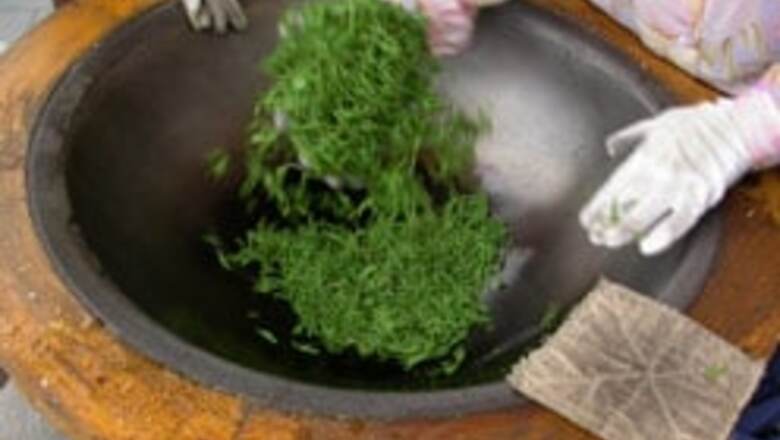
views
Kolkata: Indians, who are the world's largest consumers of tea, are developing a taste for a new brand of drink-Chinese green tea, attracted by its medicinal properties.
Chinese tea, which is drunk without sugar or milk, is now on top of the menu at plush restaurants where health-conscious Indians riding an economic boom dine.
"When we introduced Chinese green tea in our menu earlier this year, we did not know how popular it would become," said Bipul Roy, food and beverages manager at the Kenilworth Hotel in Kolkata, the hub of India's tea trade. "Now we have stockpiled 27 different varieties since people seem to love them," he added.
Regular consumption of green tea could help to protect brain cells from conditions such as Alzheimer's and Parkinson's disease, says a study in Japan published in the American Journal of Clinical Nutrition.
Green tea, mainly consumed in China and Japan, has also become popular in the West. India, which consumes about 650 million kgs of traditional tea a year, produced 927 million kgs in 2005 but exotic Chinese varieties such as white and green tea were less than one per cent.
Trade officials say the annual consumption of Chinese tea could rise to five million kgs over the next five years from an expected one million kg this year.
"Hotels across the country are offering Chinese tea and the feedback suggests that people believe it has healing powers," said Samir Pandita, food and beverages manager at ITC's Sonar Bangla Sheraton and Towers Hotel in Kolkata. "They simply love the taste,” he added.
Indian hospitals are also pushing the beverage, and green tea jostles for space at gleaming shopping malls. "We are encouraging patients to drink more of the exotic Chinese variety for rejuvenating their health," said Sajal Dutta, president of the Association of Hospitals of Eastern India, which represents top private hospitals.
India consumed 250,000 kg of Chinese tea in 2005, industry officials said. "There is a demand for this special type of tea now, but the market is very niche," Monojit Dasgupta, secretary-general of the Indian Tea Association, said.
Indian tea planters, which have been facing falling world prices and sluggish exports, are looking to shift production to Chinese varieties, industry officials said.
"After a recent visit to China, we learnt their method of brewing tea and we are persuading producers to try it here," said Rajeev Lochan, secretary of Tea Traders Association in Silguri, a prominent tea growing area in the eastern state of West Bengal.
Quality green and white tea sells for about Rs 2,000 a kg nearly the price of India's famed Darjeeling tea that is mainly sold to the United States and Germany.
Most traditional tea is sold at Rs 200 a kg in India. India produces only 50,000 kgs of top Darjeeling tea, while there are at least 10 quality varieties of Chinese tea that command premium pricing.
Industry officials say prices of green or white tea could tumble to Rs 800 a kg if large-scale production took off in India.
"I am producing white tea in my garden following Chinese guidelines and the prospect for more production seems very bright," said Lochan, one of the two Indian members of the Organic Trade Association, a worldwide body.
He also said that the planters were demarcating land in northern West Bengal for growing Chinese green and white tea.




















Comments
0 comment